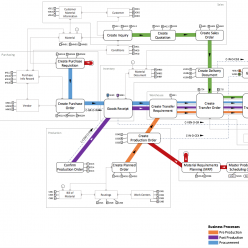ERP was created in order to close the gap between different silos in a corporation and increase the productivity efficiency. Besides that, there are so many other benefit that an enterprise can enjoy by implementing ERP to their daily operation. I would like to mention some of them here that I think are the major factors:
- Integrated information: I consider this as the most impressive features of the ERP system. It helps synchronize the data from the beginning steps of your business process until the end. Growing together with ERP on cloud, this features will create a more transparent business environment.
- Data security and regulatory compliance: aside from the fact that the system is built with firewall and security coding, the restricted view from users also play a part in creating the data security and avoid the violation of authority and between different users. It also ensures the compliance of each business process through layers of organizational levels.
- Mobility and flexibility: one of the most useful characteristics of ERP is that it is configurable according to your specific needs. For example, the system can be built based on your own business model, be it the traditional or some model that you just created and want to implement to daily operation. Moreover, the system allows you to access in data and work on it wherever you are, as long as you have a device and connection.
With some attractive features mentioned, why do all of the ERP system providers are still working hard to improve their products?
- System complexity: due to the complexity of this product, the change cannot be made rapidly. And with the growth of current market, how fast we can adapt to the demand is very important. However, this challenge also brings the opportunity to the system providers. It is when they have implemented the system with a certain provider (e.g. SAP, Oracle, Infor, etc.), they tend not to switch to another system.
- Long-haul implementation process and high investment cost: it is a long process to train the users and enhance their process instead of creating another admin layer. So if the providers are able to close a deal with a corporation, very high chance they will be their long term customers. Small-to-mid-sized ERP system is expected to be in a range anywhere from $75,000 to $750,000. And also because of the above challenge, it is still considered to be costly that is difficult for small enterprises to implement.
Having used ERP systems for almost 6 years, and residing in the Silicon Valley has helped me to have more updates about the innovation, I have observed the following risk exposure to the system. It is not just the risk for the products or system providers but also to the users of the ERP.
- System migration failure: based on my experience, the validation of data during the integration carries very high risk exposure due to the highly customized character of the system. It is supposed to enable the crossing data between different software. My team and I used to work over the weeks for 3 weeks to validate over 1,000 orders as we found out there was some data mismatch during the system transition. It takes a few weeks to months in order to train a user to be familiar with any ERP software. A research from Panorama Consulting reported that the failure rate of the ERP system has increased from 18 to 21% last year. From there, we can see that the high customized product can have very high probability of system failure.
- Staff turnover rate: it requires certain academic qualification from the employees. Once these people choose to leave their position, a corporation will need to buffer some delay in their operation. Even when a corporation does not lose any of their manpower, they still may face the resistance of the employees (especially the senior staffs) from adapting to the newly implemented ERP system.
- Data management: the accuracy of data access can cause the disruption in the operation. For example, any incorrect data access activity of any details in the ERP system can create a mistake cascade to the whole supply chain that leads to customer dissatisfaction or violation of compliance or financial discrepancy, and so on. Together with cloud expansion, there will be higher requirement for data security as well.
In general, ERP is a useful tool to improve the productivity and align the business process. However, there are still many rooms to improve from both customers and the service providers.
Sources:
http://www.softwareadvice.com/resources/7-little-known-erp-benefits/
http://www.workwisellc.com/15-benefits-implementing-erp-software/
https://www.nchannel.com/blog/common-challenges-with-erp-software-implementation/
http://www.workwisellc.com/erp-software/erp-software-cost
SAP Book
